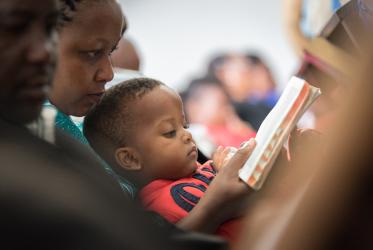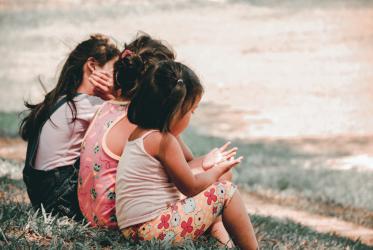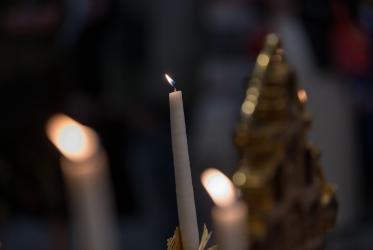*By Peter Kenny
The kidnapping of the Chibok schoolgirls in April 2014 is sadly symbolic of the suffering of children in Nigeria, says the pastor who heads the Council of Churches of Nigeria (CCN).
Rev. Dr Yusuf Wushishi, general secretary of the CCN, says the abduction from their boarding school in northern Nigeria of more than 270 female students by extremists highlights the challenge of insecurity for young people.
Dr Wushishi was in Geneva recently and said in an interview that the 18 September signing of a partnership between the World Council of Churches (WCC) and the United Nations Children’s Fund (UNICEF), pledging to support children’s rights together, is especially significant.
Under the agreement focussing on two major issues - violence against children and climate change - Nigeria, Indonesia and India were chosen as the first three countries for a pilot project.
“This agreement was signed after the release of the UNICEF Nigeria Violence Against Children Survey which shocked religious leaders as it showed there is a high prevalence of violence against children in Nigeria,” said Wushishi.
The report found that approximately six out of every ten Nigerian children experience some form of physical, emotional and sexual violence before reaching the age of 18.
It also found that one in two children experience physical violence, one in four girls and one in ten boys experience sexual violence, and one in six girls and one in five boys experience emotional violence.
“When Christian and Muslim leaders met with UNICEF to receive the report, we were shocked at its findings and knew we have to act upon it,” said the CCN leader.
The report also found that the majority of children never tell anyone about their experience and less than five percent of children who experience violence receive the support they need to recover.
“We decided we must work to end violence against children, and as the religious community we must put up our hands so as not to allow this to happen in our country,” said Wushishi.
Nigeria is estimated to have a population of around 181 million of whom more than 40 million are children. Christians and Muslims have more or less the same numbers.
The work for children’s rights in Nigeria is both ecumenical and multi-faith. It involves CCN member churches which belong to the WCC working alongside the Christian Association of Nigeria (CAN), which also has the Roman Catholic Church as well as CCN belonging to it. They work with different Muslim organizations.
“Most of the people in Nigeria have an affiliation with either church or mosque – 80 percent. If Christian and Muslim communities can join hands together, it will help to bring down the level of abuse and violence,” said Wushishi.
The CCN can reach into the combined 40 million in its member churches, said the secretary general. He belongs to the Nigerian Baptist Convention, “but in my work I represent all of us”.
Protecting child rights
The northern part of Nigeria is much poorer than the south, and violence against children can be higher in rural parts of the country, stemming from poverty which can result in the venting of anger against young members of the family, says Dr Wushishi.
He notes, “Both the Bible and the Quran say children are gifts and all human being are made in the image of God.”
“We need to build the capacity of women leaders, youth leaders, church leaders, teachers for the best way to protect children so they are loved and taken care of,” says Wushishi.
In doing so, accurate information is needed “because some people don’t know the gravity of the problems of violence and the abuse of children”.
Frederique Seidel, special advisor on children's rights at World Council of Churches, said, “This is the first time we have a global partnership between the WCC and UNICEF.”
She said at a local level in some countries there has been collaboration between WCC member churches and UNICEF. The recommendation to get the WCC to help strengthen the capacity of churches to support children came from an ecumenical conversation in Busan at the WCC’s 10th Assembly in 2013.
“Churches have a significant theological legacy for the commitment to children’s rights,” she said. “From a theological perspective, it is putting the most vulnerable at the centre.”
“The partnership supports pastors and church leaders as they witness very closely what is happening on the ground. They are often close to families and receive confidential testimonials about the violence that children can be living through,” said Seidel.
She explained that UNICEF has collected strong scientific evidence on the consequences of violence against children. The collaboration of churches in preventing this violence and supporting victims is very much needed, she said.
“By reporting child rights violations of which they are aware to UN human rights mechanisms, churches can play a very important role in concrete responses and measures to be taken for child protection,” noted Seidel.
The WCC and UNICEF will hold a capacity building seminar on 19 November at the Ecumenical Centre in Geneva on the churches' role in protecting children's rights.
It will be a milestone in the development of “principles and tools for child-friendly churches” and showcase the existing experience of churches as child rights’ advocates.
The timing is significant as it will be held one day ahead of the anniversary of the UN Convention on the Rights of the Child, which was signed on 20 November 1989.
*Peter Kenny is a journalist and communications consultant. He writes for Ecumenical News, The Wall Street Journal, The Star in Johannesburg and other media organizations.
WCC and UNICEF sign global partnership to promote children’s rights (WCC news release of 18 September 2015)







